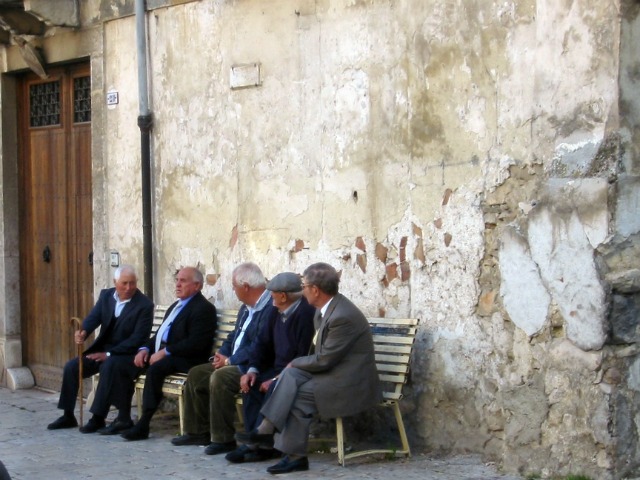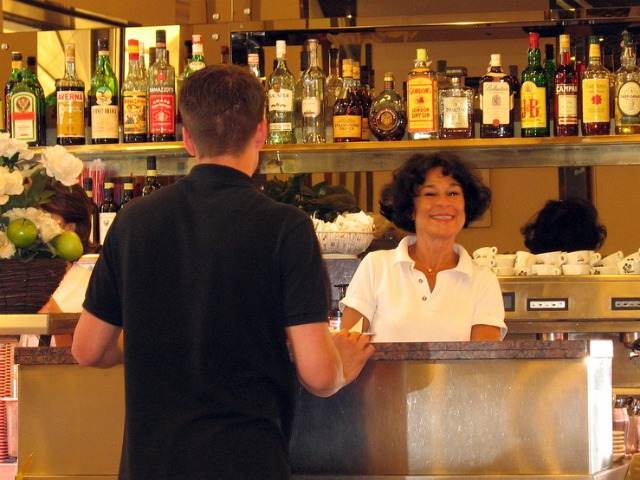It’s hard to believe, but next month we’ll celebrate our first anniversary of the Italy Roundtable. Alexandra, Gloria, Melanie, Rebecca and I have enjoyed tackling a new topic each month, and we’ve especially enjoyed hearing from readers. In fact, we were so pleased with how our last invitation went for bloggers to join us at the Roundtable that we thought we’d extend another! This month, not only is the Italy Roundtable topic INVITATIONS, we’re inviting anyone who wants to participate to blog about one of the past year’s Roundtable topics. Our invitation details are at the bottom of this post.
There are, I’ve come to understand, different ways to be an expat, just as there are different ways to be a traveler. There are those who refuse to learn the local language and associate only with other foreigners, and others who refuse to speak their mother tongue or even acknowledge that they are foreign. Between those two extremes is where most expats lie, trying to achieve and then maintain a precarious balance of integrating into a foreign culture while still maintaining links to one’s native culture.
Writings about the expat experience almost always focus solely on the expats, with good reason. It’s ridiculous to expect an entire culture to change because a few foreigners show up thinking they’ve got a better way of doing things. The expat is, however long they’ve been living there, always going to be the outsider – which is why I’d like to focus here on another critical component of the expat experience: the locals.

Locals aren’t given the option to choose whether to invite foreigners into their country in the first place, but they absolutely have the power to make those foreigners feel either like intruders or welcomed guests. Newcomers will, right or wrong, base at least some of their opinions of an entire country’s culture on how receptive the first few residents they meet may or may not be. Locals, therefore, bear the responsibility of being ambassadors for their culture, whether they asked for the role or not.
When you walk into a room full of people who know one another, it’s easy to spot the outsider. Not everyone is comfortable doing this, but I believe everyone would like to be the kind of person who would invite that newcomer in – introduce yourself, ask some questions, help the outsider make connections in a room full of strangers. It’s not about doing all the work for someone else, it’s about pointing the way in what seems like complete darkness.
I realize that not every culture is good at this kind of thing, and in some cases it may go against cultural norms to bring an outsider in. But I also believe that the task of integrating into a new culture doesn’t just lie in the lap of the expat – it’s a shared responsibility between outsider and insider, a dance of expat with local. It’s about a newcomer’s ability to adapt to a new way, and a local’s ability to accept theirs isn’t the only way. Because of this, it relies heavily not just on the expat’s willingness to be open to new ideas, but on the local’s willingness to extend an invitation to a stranger.

It’s been so long now since I first heard this that I can’t even recall the source, but I remember being told that Italians are notorious for seeming open and welcoming, but that they rarely invite people who aren’t family into their homes. You can see how this might play out just by watching people when you’re on vacation in Italy – they socialize with friends and coworkers at the bar in the mornings as they knock back a quick coffee, standing in the piazza on the way to or from the market, over long lunches (never eaten at one’s desk), again at aperitivo in the evening, sitting on benches and steps in front of apartment buildings, and during the nightly passeggiata. And then, after all this public socializing, they go home to spaces kept deliberately private.
Things seem to be changing slowly, as younger generations are more open than their parents and grandparents, and yet I always feel as if I’m given a precious gift when I’m asked into an Italian’s private home. Since I’m already an off-and-on guest in their country, such an invitation reminds me of the honor with which it should be received. As a result, I’ve come to treat other encounters with Italians with that same respect. Being greeted by a kiss on the cheek, being introduced to long-time friends, being treated like one of the gang – each of these actions now feels to me like an outstretched hand in a room that’s getting a bit less dark every day, and each time I’m humbled and grateful.
Extending an invitation into one’s culture can be intimate, when asking a newcomer to dinner at home, or casual, when weaving him or her into an existing circle of friends. What’s important is that the invitation exists. There simply can’t be a meaningful connection without it.
 What invitations are the other members of the Italy Blogging Roundtable extending this month? Find out by clicking on their links below.
What invitations are the other members of the Italy Blogging Roundtable extending this month? Find out by clicking on their links below.